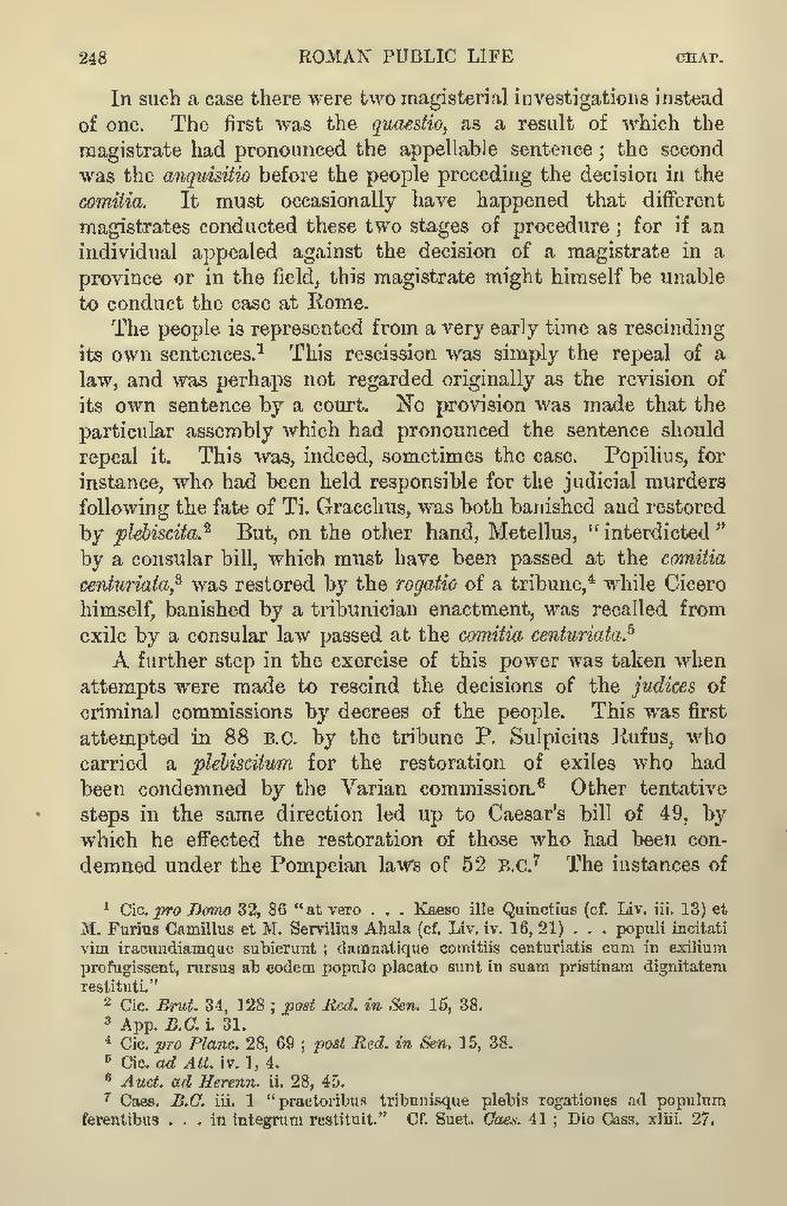In such a case there were two magisterial investigations instead of one. The first was the quaestio, as a result of which the magistrate had pronounced the appellable sentence; the second was the anquisitio before the people preceding the decision in the comitia. It must occasionally have happened that different magistrates conducted these two stages of procedure; for if an individual appealed against the decision of a magistrate in a province or in the field, this magistrate might himself be unable to conduct the case at Rome.
The people is represented from a very early time as rescinding its own sentences.[1] This rescission was simply the repeal of a law, and was perhaps not regarded originally as the revision of its own sentence by a court. No provision was made that the particular assembly which had pronounced the sentence should repeal it. This was, indeed, sometimes the case. Popilius, for instance, who had been held responsible for the judicial murders following the fate of Ti. Gracchus, was both banished and restored by plebiscita.[2] But, on the other hand, Metellus, "interdicted" by a consular bill, which must have been passed at the comitia centuriata,[3] was restored by the rogatio of a tribune,[4] while Cicero himself, banished by a tribunician enactment, was recalled from exile by a consular law passed at the comitia centuriata.[5]
A further step in the exercise of this power was taken when attempts were made to rescind the decisions of the judices of criminal commissions by decrees of the people. This was first attempted in 88 B.C. by the tribune P. Sulpicius Rufus, who carried a plebiscitum for the restoration of exiles who had been condemned by the Varian commission.[6] Other tentative steps in the same direction led up to Caesar's bill of 49, by which he effected the restoration of those who had been condemned under the Pompeian laws of 52 B.C.[7] The instances of
- ↑ Cic. pro Domo 82, 86 "at vero . . . Kaeso ille Quinctius (cf. Liv. iii. 13) et M. Furius Camillus et M. Servilius Ahala (cf. Liv. iv. 16, 21) . . . populi incitati vim iracundiamque subierunt; damnatique comitiis centuriatis cum in exilium profugissent, rursus ab eodem populo placato sunt in suam pristinam dignitatem restituti."
- ↑ Cic. Brut. 34, 128; post Red. in Sen. 15, 38.
- ↑ App. B.C. i 31.
- ↑ Cic. pro Planc. 28, 69; post Red. in Sen. 15, 38.
- ↑ Cic. ad Att. iv. 1, 4.
- ↑ Auct. ad Herenn. ii. 28, 45.
- ↑ Caes. B.C. iii. 1 "praetoribus tribunisque plebis rogationes ad populum ferentibus . . . in integrum restituit." Cf. Suet. Caes. 41; Dio Cass, xliii. 27.
